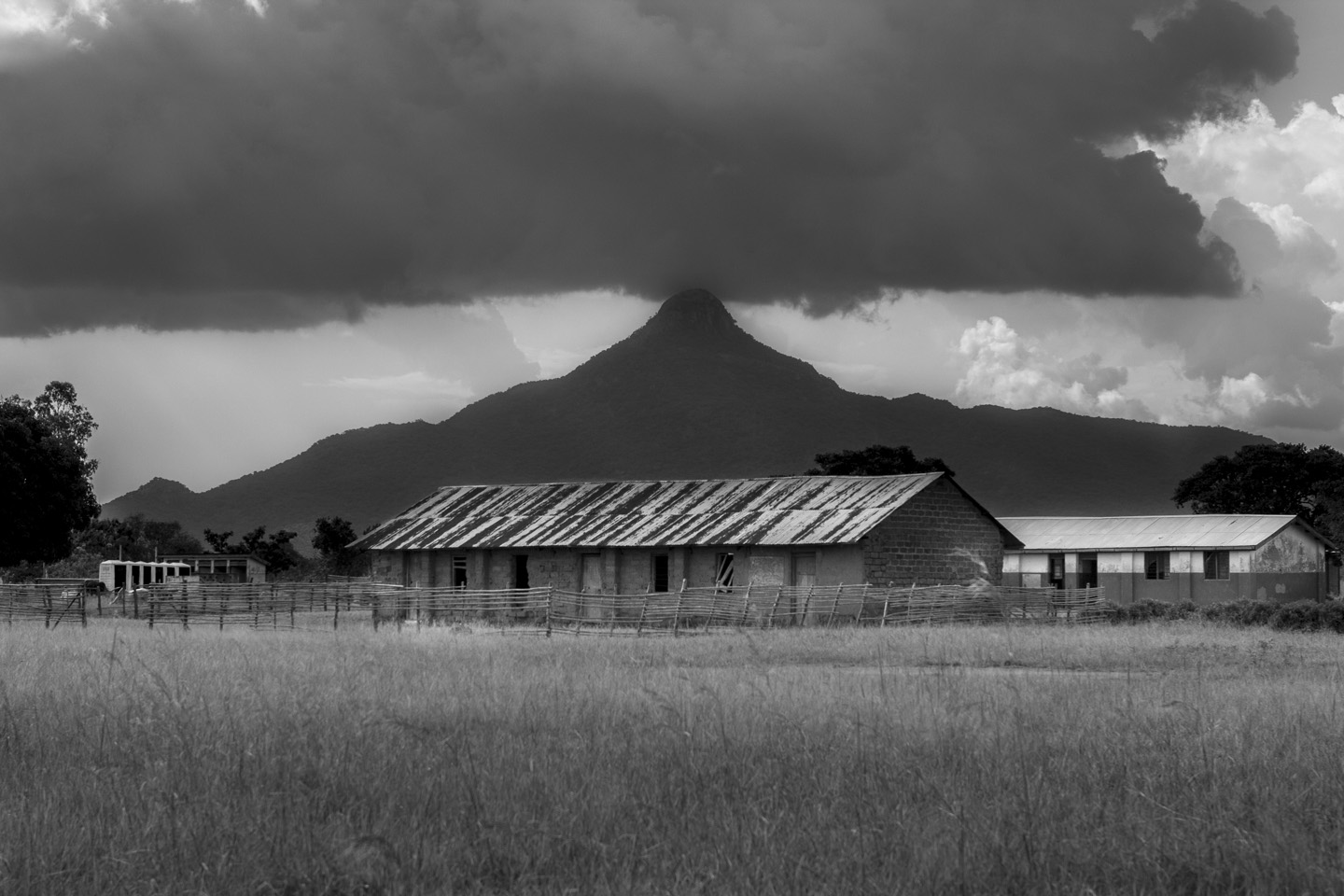Up at 09h00 and off. I have my letter, hat, sunscreen, and the weather’s looking beautiful. The boda has no mechanical issues, and the flooding has receeded. Right through to the trading post, the road is hard baked and fast. Everything’s in our favour for a change. We make it to the trading post by 11h00, and it’s deserted. None of the storefronts have really opened, and there’s no sign of the guards who harassed us for a letter when we came through last week. So we continue on to the base of the mountain that houses Lututuro prison, park the bike in shoulder-high grass on the side of a single-width pathway that winds past a dozen thatch homes, and begin our ascent to the mountaintop.
I don’t (and I’ve thought about it a good deal since) recall ever having done a tougher hike. Pushing up a crazily steep gradient, I am reduced to a sweaty, puffing, water-sucking wreck. My only consolation on the ascent (at a rate of perhaps twenty meters a time with breaks) is that we manage to overtake an eight year old girl who looks close to tears at the pain of her own ascent. And her mom. A little over an hour later and feeling quite dizzy by now, because I am unfit and had only two chapattis for breakfast, we start to encounter more level paths.
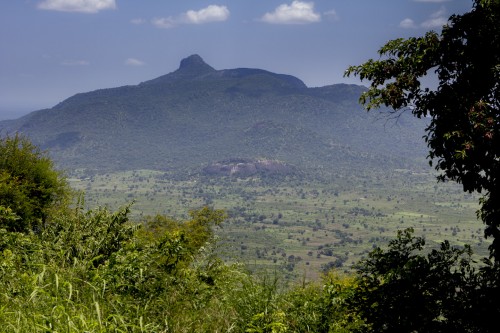
A beautiful day for a second try at seeing the thrones. The view from the prison includes Lamwo mountain in the distance, with its characteristic ‘shark fin’-ish tip.
Not too much further, we emerge outside the Lututuro prison. Which – except for the canary-yellow uniforms of the prisoners – appears to resemble just another thatched hut village in most respects. It just happens to be on top of a really hard-to-climb mountain. Lututuro appears to be a basically self-sufficient enterprise, growing crops and keeping hens in a series of fields laid out on the plateau, while the prisoners’ huts are indistinguishable from those of the guards except for the lack of any sign of family life and a roughly built wooden fence surrounding them. Alcatraz this isn’t. Though I suppose the disincentive for escaping lies not so much in the security of the prison layout itself, as it does in how unbelievably remote the area is. It would take the Lord’s Resistance Army, traveling with supplies, three days to march to Kitgum from the Sudanese hills that begin just over the next ridge. It would take a prisoner much longer, with not all that much on the way except isolated villages and scattered trading posts – none of whom would probably take kindly to a yellow-clad interloper.
One of what appears to be four guards in the entire prison comes out smiling to greet us, laughing a little that we made it at last – he explains that he was one of those sitting in the trading post last weekend. He’s not the man in charge though, for whom we need to wait for final, authoritative permission to poke around, so Peter and I sit on a pair of home made benches underneath a Mango tree and fill out a tatty guest book that the guard has pulled out of somewhere.
It’s midday, or just past it now, and the sun is already starting to softly bake the surroundings just past the edges of the mango tree shade. A light breeze passing underneath the thick green leaves and over our benches turns my hiking sweat to ice. Which, on balance, is probably pleasant, I decide. Over in the prisoner’s fenced village, a radio is squawking the kind of top 40 playlist that you can pick up pretty much anywhere in the world that American culture has reached. It’s the cultural equivalent of the China-made plastic that you’ll find from Berlin to Bunia.
It’s a reminder, also, of the strange disconnectedness of the world. The sounds of R&B artists from advanced, concrete cities emerging all the way out here, on the Ugandan/South Sudanese border. It’s like listening to Spotify on the bus as it flies past villages with neither electricity nor running water. And even the interior world, I suppose, of the postgraduate, north-educated mzungu who comes to help, or just poke around looking for the stories of the thrones of dictators. There’s so much bundled up in that subjective disconnection. Injustice, inequality, but also just yawning chasms between different experiences of what it means to be a human being. Without putting a hierarchy onto the differences, the fact of almost incommunicably strange lived realities makes a mockery of the witless appeals to ‘we are all just human’ that a particular kind of blinded optimism espouses. Genetically, perhaps. But subjectively, we still brush up against each other and move through each other’s spaces with no less strangeness than an encounter with aliens would involve.
A prison work crew of perhaps a half dozen men in rough yellow shorts and tops plods by carrying firewood for whatever is going to be prepared for dinner tonight. There’s a good chance that the meal is still grazing somewhere nearby – fully expecting tomorrow to be much like today. Though judging from what of the prison farm is visible form under the mango tree, dinner is more than likely one or more chickens – for whom I’m not sure the horizon of expectations extends more than a few minutes into the future.
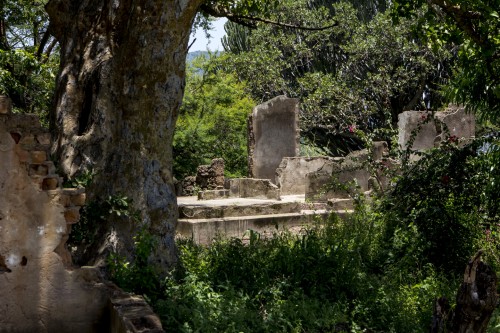
Poking out of the trees a few hundred meters from the mango tree – the ruins we’d come so far to see.
Following up the rear of the procession with little more than a stick and a stern look is a man who looks very in-chargish. He’s also the only person – besides the prisoners – who is wearing any kind of uniform, with all of the other guards wearing sandals and mixed combinations of shorts and open-collared shirts. He introduces himself as Odong Ignatius, and checks my paperwork against my passport and who I said I was in the guest book.
One of the guards tells me matter-of-factly that they need to make sure that I am not from Mossad, here to spy on the prison. A suspicion mildly elevated by the fact of my whiteness while carrying a South African passport. “Where were you born?” Ignatius asks.
“Johannesburg”, I reply.
He looks at me strangely.
“But where are your parents from?”
“Also South Africa.”
To pre-empt where this is headed, I relate a short and probably fictitious history that has me and my people in South Africa for around five generations. Then somewhere in Scotland before that. Which probably overstates the length of the Stupart family sojourn in South Africa, but should at least dislodge any notions of me being an Israeli spy.
“Israeli spies are very good at getting false passports”, a second guard in a white shirt and dirty sandals opines.
“But they mostly prefer to use French ones.”, the guard with the visitor’s book counters.
It doesn’t help much that, when asked to show them the contents of my backpack, there are three different cameras and a sound recorder in it. Which I explain, straight-faced, is for collecting animal and environmental sounds. So I’m not a Mossad agent, I am just a crazy mzungu who appeared on top of their mountain on this particular Saturday morning, bearing a ton of cameras and absolutely no stated interest in the prison, but a burning curiosity to see some broken ruins nearby.
Nobody actually says that, of course. Everyone is too polite. But the thought is there. Like the sweat-freezing breeze under the mango tree. White Shirt starts making trouble about the fact that my permission letter is handwritten, and then swaps to how they have no airtime on their phones and could really use a top up.
Over the years and the miles, I’ve discovered that there are basically three routes to getting somewhere that people are not particularly keen on letting you go. Authority, money, or goodwill. They exist in a kind of balanced triangle and, to the extent that you have a lot of one in any given scenario, you should need little to none of the others. I have my letter, which gives authority, though not overwhelmingly, and so the next fifteen minutes are spent asking interested questions about Uganda and the prison farm, and fielding queries about South Africa in a bid to gain enough goodwill that I’ll be allowed to see the Amin ruins.
Also, I’ll be damned if I am going back down this mountain without at least a picture.
As it happens, Ignatius takes a shine to me and that pretty much settles the politics of the situation. He tells the guard with the guestbook to show me the ruins, as long as I agree not to take pictures of the much-less-interesting prison for my Zionist overlords. So agreed, we set off a few hundred meters from the mango tree to the edge of a sheer face of the mountain.
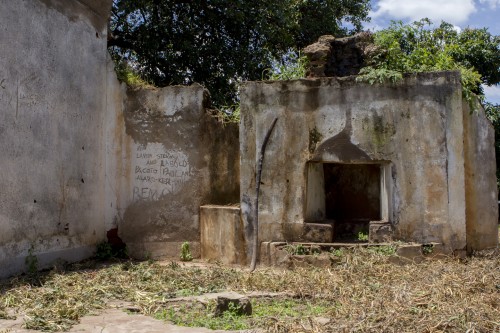
The ruins of the ‘King George’ house, featuring what is left of a fireplace. Likely built by the King’s African Rifles, destroyed by the UPDF, and featuring graffiti added by the prisoners since.
There are, as it turns out, two house ruins on the site. The older set, Ignatius tells me – and he emphasises this – was built in 1939 by King George, who actually stayed there. Which I suspect means that it was built by the King’s African Rifles around the period that this area was still Sudan (the borders changed) as a fortification/lookout over the border. Which would also then handily explain how Amin knew the site existed, as he served in the KAR for a period, and would quite likely have either been stationed here, or passed through the site. It seems unlikely that the English regent actually lived here for any period of time. Much less so just after the outbreak of World War II.
The Amin house was then built later, around the early 1970s, as a retreat where Amin and ministers would go to discuss Important Things. The thrones, when we reach them, are partly buried under leaves and blocked by a large pair of cut branches which Ignatius has White Shirt and the guard with the guidebook help us clear. While we are so engaged, he explains that the site was briefly considered as a historical monument some years ago, but that it’s been so widely forgotten, inaccessible and ruined that it seems nobody thought it worth the effort. The only road up to the prison is a long dirt one created in 1939 and little graded or maintained since, with the only practicable alternative route being the hike of death that Peter and I had undertaken earlier in the morning.
And ruined the site is indeed. The thrones are in fair condition, but both houses are now little more than foundations used for drying beans and sorghum on, and a few stubs of walls. In the 1980s, Ignatius explains, the Lord’s Resistance Army would pass through the valley below on their way south to murder and terrorise places like Kitgum. In response, the Ugandan People’s Defence Force garrisoned the site as a lookout, but largely trashed the buildings at some point during that time. Perhaps to deny them to the LRA, or out of boredom – Ignatius is not really sure.
Once I’ve photographed my fill of throne pictures – high angle, low angle, empty throne, Peter on throne, me on throne – White Shirt gives us a tour through the room-shells of the ruined house, ending up at Amin’s former squat toilet, which has been closed up with rocks and so is no longer available for use in what would be a very literal marking of one’s territory in the wake of a dictator. White Shirt explains that there is also meant to be a cave slightly further down the mountain face with some more thrones, where Amin and company could have escaped to and defended themselves from in the event of an attack. But the cave is much too overgrown for us to access today, and so is left as one extra bit of unphotographed material for the next interested historian to come and take a look at.
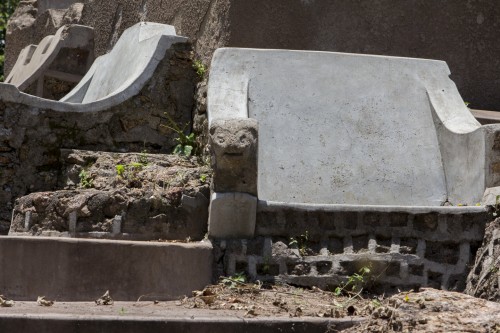
The thrones at last. Amin’s in the foreground, his wife’s to the left, and what was apparently the defence minister’s behind it.
The journey back down the mountain – owing to a lack of up and a generally triumphant attitude – is an easy affair. The bike is still in the long grass when we arrive back on the footpath in the valley, and it works just fine to get us back home. The photos will be great. Technical quality aside (limited time, and full noontime sun), they’re probably some of only a tiny handful that exist of what was once the prized lookout point of a man who thought so much of himself that there are Reddit threads dedicated to sharing his lengthy, self-bestowed title.
When I was still in high school, I remember studying the poem Ozymandias by Percy Shelley, and its sad, lonely image of the ruler’s broken memorial lying in an empty landscape. I expect that there are many palaces and castles, thrones and lookouts across landscapes now as remote as the Lututuro mountain, which were once the prized fortresses of Powerful Men. Men who lost their lives and their legacies to the cameras and the thoughts of the generations that outlived them. Forgotten, in the main, by a world they thought they rode high upon.
Barring a miraculous enthusiasm for Amin history that it’s hard to imagine current, Amin-toppling, president Yoweri Museveni having, that concrete will be gone before anyone cares to memorialise the man. And, in tiny puffs of grey concrete dust, swallowed into the fertile earth and pecked at by prison chickens, Amin as he knew himself to be will become unrecoverable.
There’s a beautiful sky on the ride home to Kitgum.
I met a traveller from an antique land
Who said: “Two vast and trunkless legs of stone
Stand in the desert. Near them, on the sand,
Half sunk, a shattered visage lies, whose frown,
And wrinkled lip, and sneer of cold command,
Tell that its sculptor well those passions read
Which yet survive, stamped on these lifeless things,
The hand that mocked them and the heart that fed:
And on the pedestal these words appear:
‘My name is Ozymandias, king of kings:
Look on my works, ye Mighty, and despair!’
Nothing beside remains. Round the decay
Of that colossal wreck, boundless and bare
The lone and level sands stretch far away.

